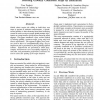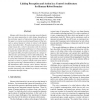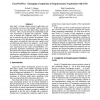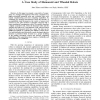1019 search results - page 16 / 204 » Managing Complexity in Large Learning Robotic Systems |
ICRA
2000
IEEE
14 years 1 days ago
2000
IEEE
Mobile robots require the ability to build their own maps to operate in unknown environments. A fundamental problem is that odometry-based dead reckoning cannot be used to assign ...
HICSS
2003
IEEE
14 years 28 days ago
2003
IEEE
Human-robot interaction is a growing research domain; there are many approaches to robot design, depending on the particular aspects of interaction being focused on. In this paper...
HICSS
2002
IEEE
14 years 18 days ago
2002
IEEE
More than ¾ of large software projects suffer large cost and schedule overruns or fail outright. Deficits in project requirements cause more than half of these failures and overr...
SC
2009
ACM
14 years 2 months ago
2009
ACM
In this paper, we discuss some of the lessons that we have learned working with the Hadoop and Sector/Sphere systems. Both of these systems are cloud-based systems designed to sup...
IROS
2007
IEEE
14 years 1 months ago
2007
IEEE
Abstract— In this paper we present a case study of cooperation of a strongly heterogeneous robot team, composed of a highly articulated humanoid robot and a wheeled robot with la...




